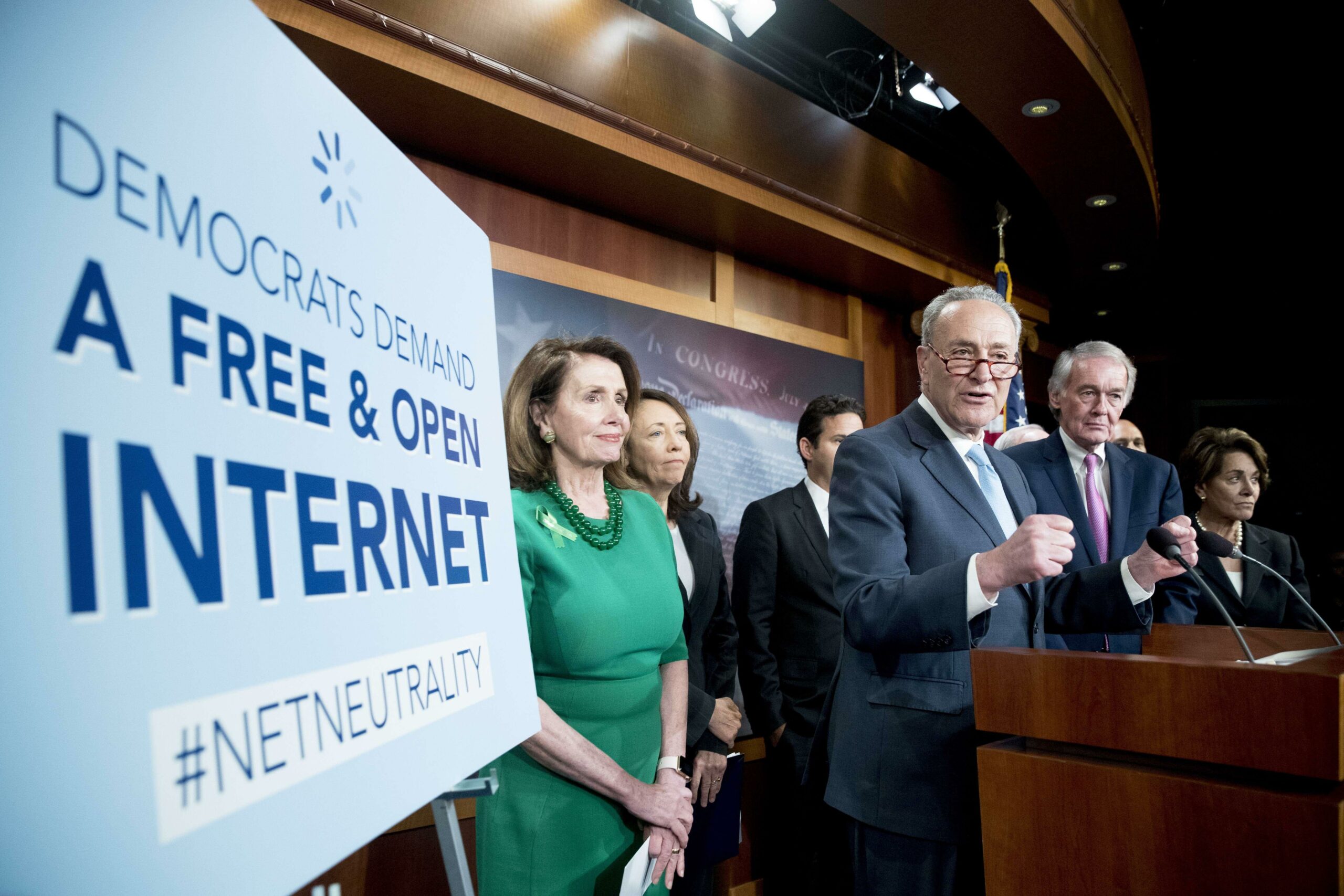Senate Votes To Overturn Net Neutrality Repeal

AP Photo / Andrew Harnik – Net Neutrality
Senate Minority Leader Sen. Chuck Schumer of N.Y., accompanied by House Minority Leader Nancy Pelosi of Calif., left, Sen. Maria Cantwell, D-Wash., second from left, Sen. Ed Markey, D-Mass., and Rep. Rep. Anna Eshoo, D-Calif., right, and other Democratic congressmen, speak at a news conference on Capitol Hill in Washington, Wednesday, May 16, 2018, after the Senate passes a resolution to reverse the FCC decision to end net neutrality.
The U.S. Senate approved a resolution to nullify the Federal Communication Commission’s repeal of net neutrality May 17 in a 52-48 vote.
But the chances of stopping the FCC repeal are still slim as the resolution needs to be approved by the Republican-dominated House and would have to be signed by President Trump.
The Senate approved a Congressional Review Act (CRA) resolution that can overturn the FCC’s December vote to put an end to net neutrality, according to NPR. All 49 members of Democratic caucus, who brought the resolution to the Senate floor, and three Republicans voted to approve the CRA.
If the CRA is approved, Internet service providers will have to continue to comply with Obama-era rules that prohibit blocking, throttling and paid prioritization. If not, the FCC repeal will take effect June 11 and will allow ISPs to speed up or slow down customers’ access to certain websites and apps.
The FCC rollback has received heavy criticism since it was approved, with critics saying consumers will be forced to pay more for less content.
Net neutrality has been a hot-button issue for Democrats, who plan on continuing the fight to overturn the FCC repeal into the 2018 midterms if the CRA is not passed.
“The grandparents, the gamers, the gearheads, the geeks, the gif-makers, the Generations X, Y, and Z. This movement to save net neutrality is made up of every walk of American life,” Sen. Edward Markey, D-Mass., said during the debate over the resolution.
Republicans overwhelmingly support the move to do away with net neutrality, as they hope to take regulative authority away from the federal government in the name of a free market.
“If the Democrats want to run on regulating the Internet, I think that’s a losing strategy,” said Sen. Cory Gardner, R-Colo.
As Pollstar reported last year, the end of net neutrality could have long-lasting consequences for the live music industry. Some are concerned that opening a higher-speed pay-lane for companies and/or consumers will give an advantage to secondary-ticketing websites that use bots to buy up large amounts of tickets for high-demand shows.
“Less true fans will get access to face-value tickets because of the path the FCC is going down,” Ant Taylor of fan-to-fan ticket exchange company Lyte told Pollstar in December.
“Who’s got the coin to pay to be in that [higher-speed] lane for an onsale at 10 a.m. on a Friday?” he said. “I guarantee you who doesn’t have the coin is the consumer. Who does have the coin is scalpers.” Taylor said. “We are all fighting to get tickets into the hands of true fans and you’ve got [someone] at the FCC who literally can hamstring the whole operation.”
Several musicians have taken up arms against the net neutrality repeal as well. Graham Nash, Incubus, Talib Kweli, Bassnectar, STS9, Against Me! and Michael Stipe were among the artists that signed a letter sent to Congress by nonprofit Fight For The Future to request overturning the December FCC vote.
FREE
 Daily Pulse
Subscribe
Daily Pulse
Subscribe
 Daily Pulse
Subscribe
Daily Pulse
Subscribe

